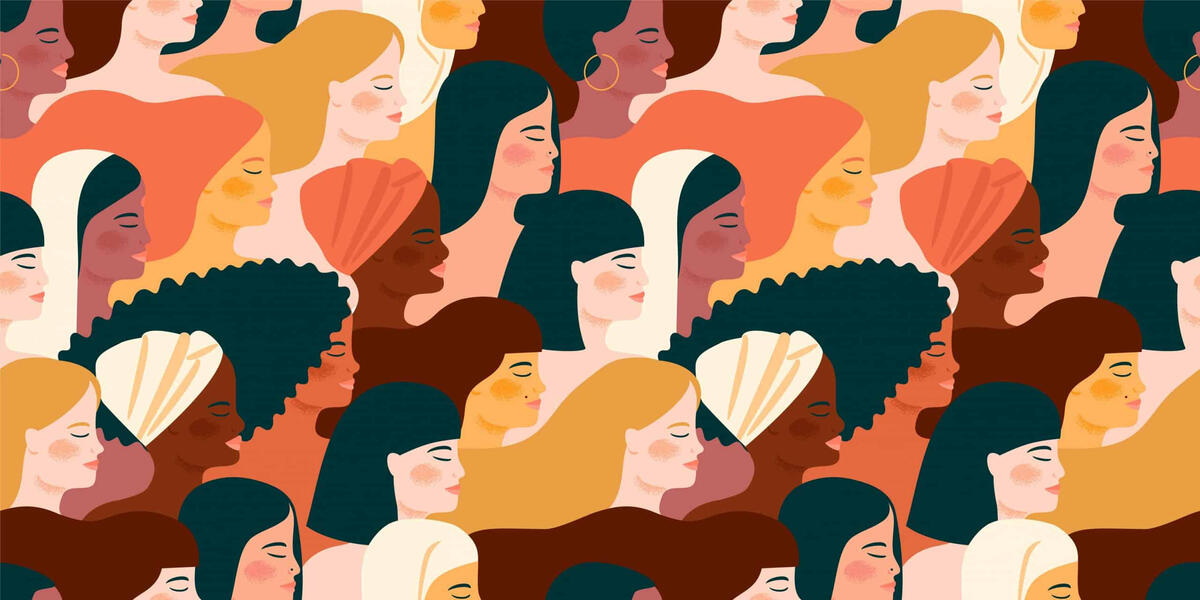
My Feminist Utopia Intersectionality
My Feminist Utopia consists of an intersectional feminist framework that examines all systemic forms of oppression to establish solidarity within and among all oppressed groups. In this ideal future, the path to liberation doesn't narrow towards privileged women; instead, it widens to include black women, women of color, indigenous women, poor women, disabled women, muslim women, the LGBTQ+ community and more. It's the emancipation of everyone, a liberty defined by equity and social justice. Reproductive rights, gender equality, wage equality, dismantling hegemonic masculinity, workplace safety, LGBTQ+ rights, and more must be attainable to people of all identities. Collective liberation of all oppressed groups requires an interdependency void of presumptuous, racist, patriarchal, neocolonial, and orientalist attitudes to examine our differences to include all disenfranchised marginalized groups in the cause.Patriarchy, capitalism, and white supremacy are the current, active systems of oppression that affect all groups. The roots of these structures extend to other social, political, economic, and environmental causes like global warming, colorism, pollution, ableism, sexism, homophobia- and so much more. My feminist utopia doesn't stop at acknowledging our intersectional identities- it works towards dismantling these inevitable intertwined structures to achieve freedom for all.
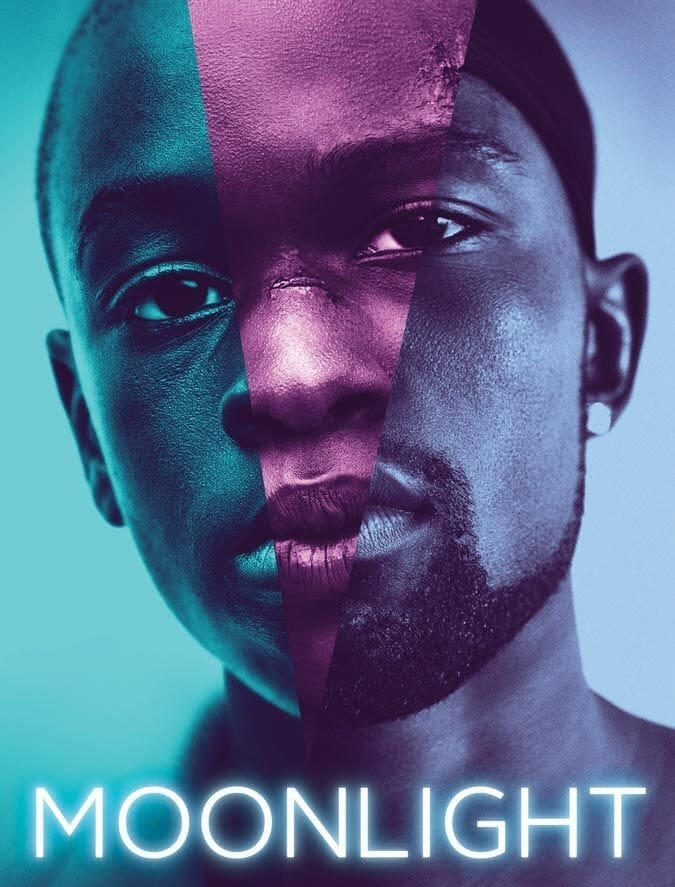
Moonlight (2016)
Moonlight(2016) Trailer
Moonlight is an LGBTQ+ movie about a boy, Chiron, coming to terms with his identity as a gay Black person. He grew up in poverty in a neighborhood of crime, violence, and drugs, as well as an abusive mother and an absent father. He conforms to the stereotypes of Black men as he puts up a hypermasculine front to deflect his homosexuality and conceal his identity. These intersections of race, class, gender, and sexuality clash and instill conflict within him. He finds comfort in Kevin, a fellow gay Black man, whom he can be himself with.This movie is an excellent representation of intersectional differences and identities and how solidarity between diverse individuals generates a drive toward change for the better. Chiron is able to achieve inner peace with Kevin since they share a mutual understanding of their experiences as a Gay Black man in a lower-class, criminalized environment.
Kimberlé Crenshaw
"These failures from our past, the failure to interrogate patriarchy and anti-racism, the failure to interrogate racism and feminism continue to shape modern politics. They undermine our collective capacity to create a more robust and inclusive set of coalitions around social justice [...] the continuity between this discourse and discourse 50 years ago is a continuity made by intersectional failure."
Crenshaw has vocally criticized the exclusion of Black women in the Black rights movement and has emphasized the need to sever the solidarity between Black men and the patriarchy. This indifference rooted in systemic forms of oppression occurs within and among all social groups that prevent collective liberation, and the disregard or even mere tolerance of differential identities encourages an essentialist viewpoint within already disenfranchised communities that pushes marginalized groups, typically the poor, women, and queer individuals, to the periphery. The framework of intersectionality does not tolerate subjugation in any form, and everyone's issues must be at the center of analysis to generate change and prevent the racist, classist, and patriarchal repetitions of the past.
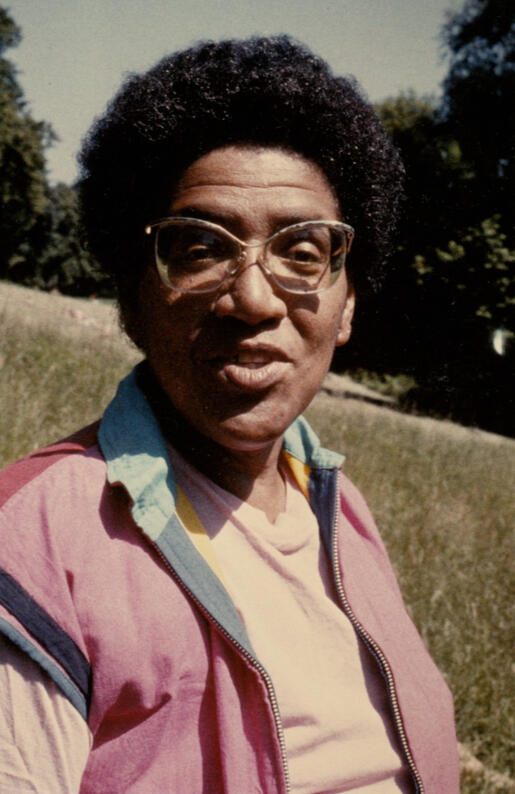
Audre Lorde
"Within the interdependence of mutual (nondominant) differences lies that security which enables us to descend into the chaos of knowledge and return with true visions of our future, along with the concomitant power to effect those changes which can bring that future into being. Difference is that raw and powerful connection from which our personal power is forged."A snippet from Audre Lorde's The Master's Tool Will Never Dismantle the Master's House. She advocates for interdependence between all women, regardless of class, race, gender, and other identities, to obtain a comprehensive understanding of the other's oppression to orchestrate a liberation movement that is both inclusive and collective. It is integral to the framework of intersectionality. Acknowledging our differences yields a radical force that disarms the weapons of privilege that white, middle-class women wield and reveals the layers of patriarchy, capitalism, and white supremacy obscured in the feminist movement.
Angela Davis: Abolitionist Feminism
In the video, Angela Davis explains why carceral punishments for solving gender-based violence are a paradoxical approach that only reproduces and exacerbates the problem. Punishing perpetrators is not a viable solution, as it completely ignores the structural and systemic injustices that contribute to these issues and only encourages police scrutiny in black and brown communities that criminlize them further. Incarceration is already a discriminatory institution that operates under a racist, patriarchal, and capitalist framework to disproportionately represent disenfranchised groups in its system to maintain white supremacy. Mainstream carceral feminism, therefore, is victim to its predecessors' mistakes, adapting yet again the myopic, racist patriarchal attitude of their male oppressors that preserves the hiearchies of society.
The abolition feminist approach encourages a deep, thorough examination of our differences that surface the implications and complexities of our differential oppressions, which is precisely how intersectional feminism should be employed. Social justice in the form of incarceration is not viable if the solution thrives in a society that is premised on violence against minority groups.
What do we need?
To achieve my feminist utopia, reshaping feminism to include an intersectional framework is the most crucial step. Fortunately, the current wave of feminism has already achieved this. The internet has contributed plenty to spreading information and amplifying the voices of marginalized groups (for example, the worldwide support for Palestine that rallied protests across continents). As helpful as this is, the internet cannot be the only source of information. I believe sociology courses should be mandatory in the curriculums of academic institutions as early as high school. We are perpetually bound to the systemic structures of society that produce the political climates we live in, and to ignore the sociopolitical environment is a privilege. To achieve this, however, our public education system must be reformed so it is properly funded and supported. This approach, ironically, is also under the framework for intersectionality. There is a lot to do, but for now, the internet has radicalized the progressive youth for the better, and it is a huge step towards change.
Personal Artifact: Anecdotes
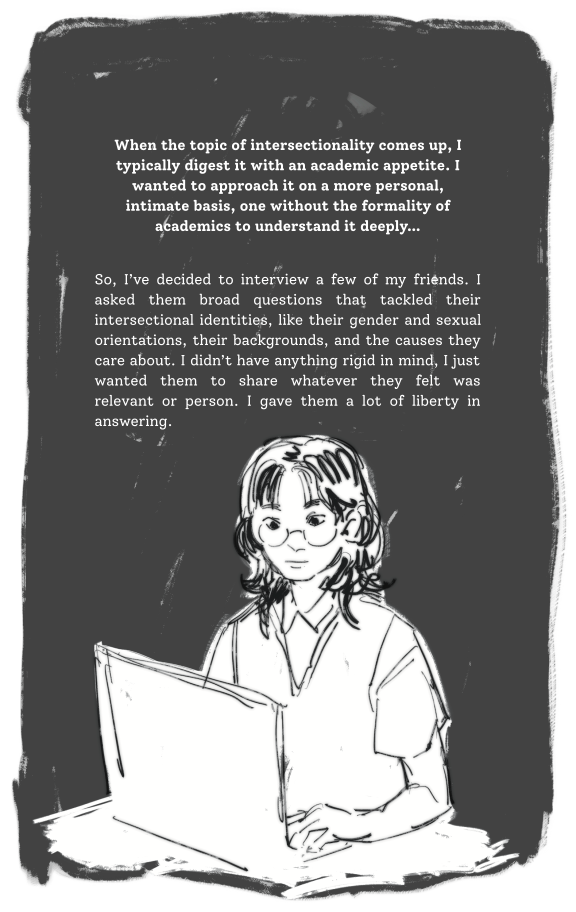
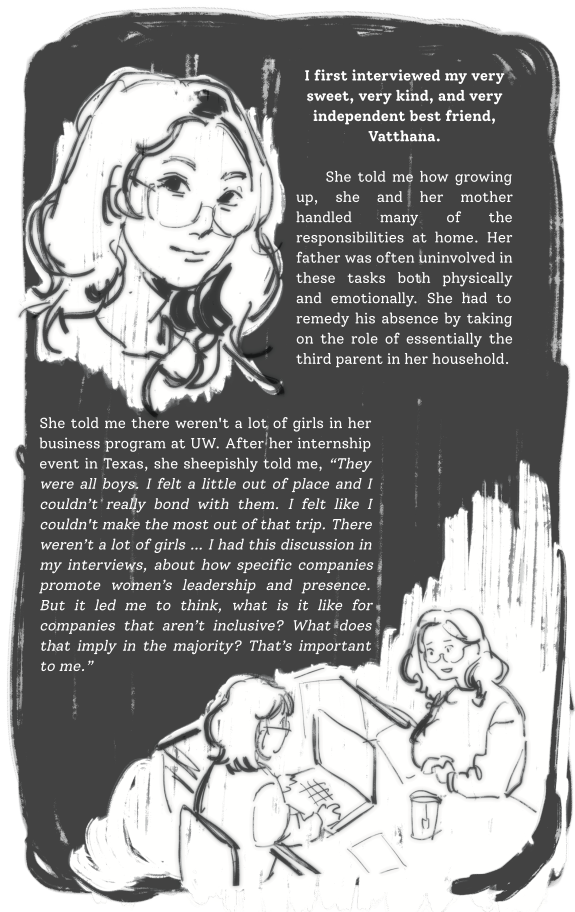
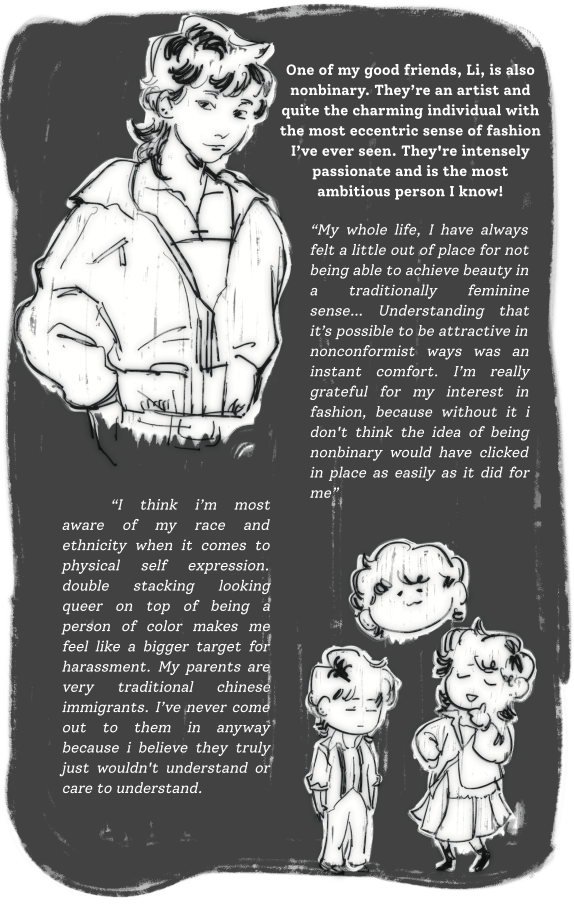
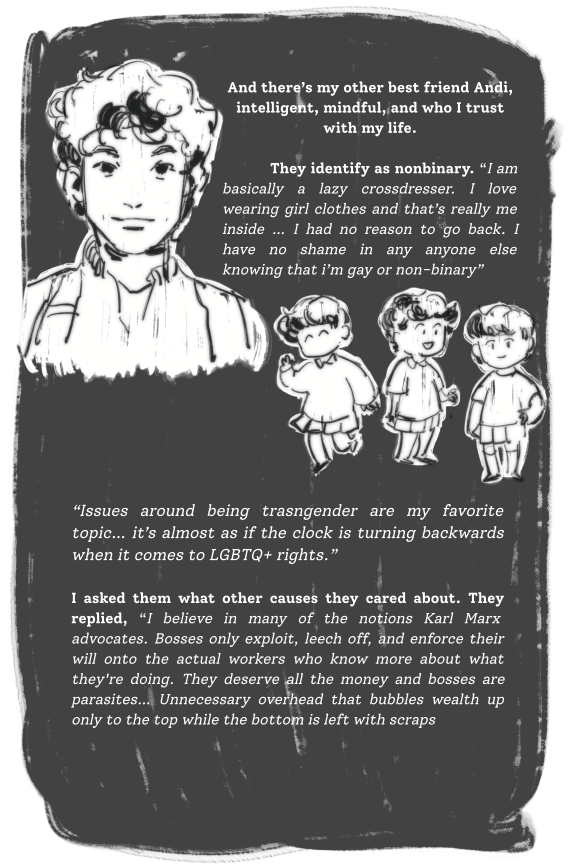
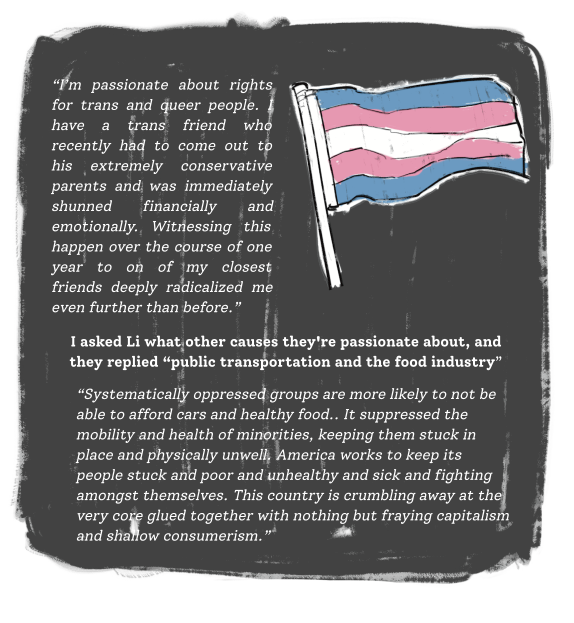
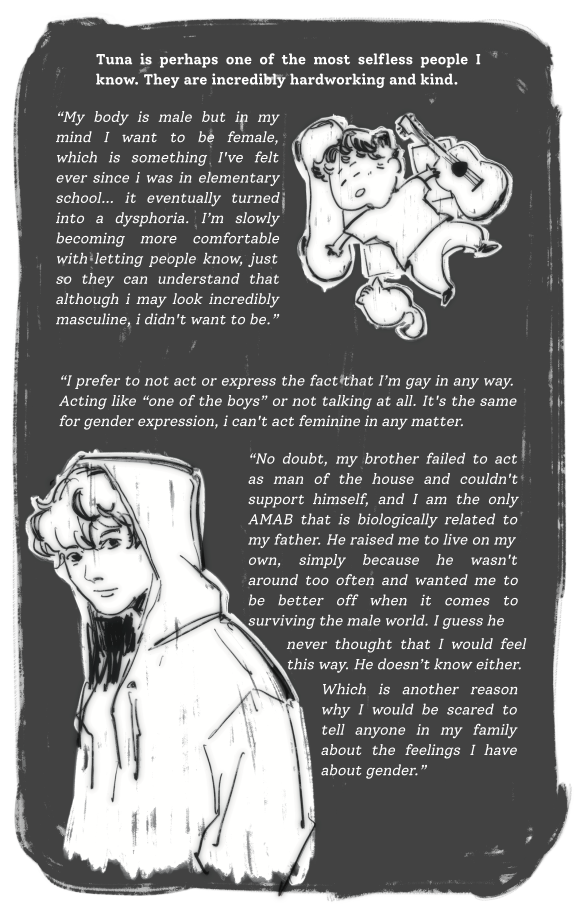
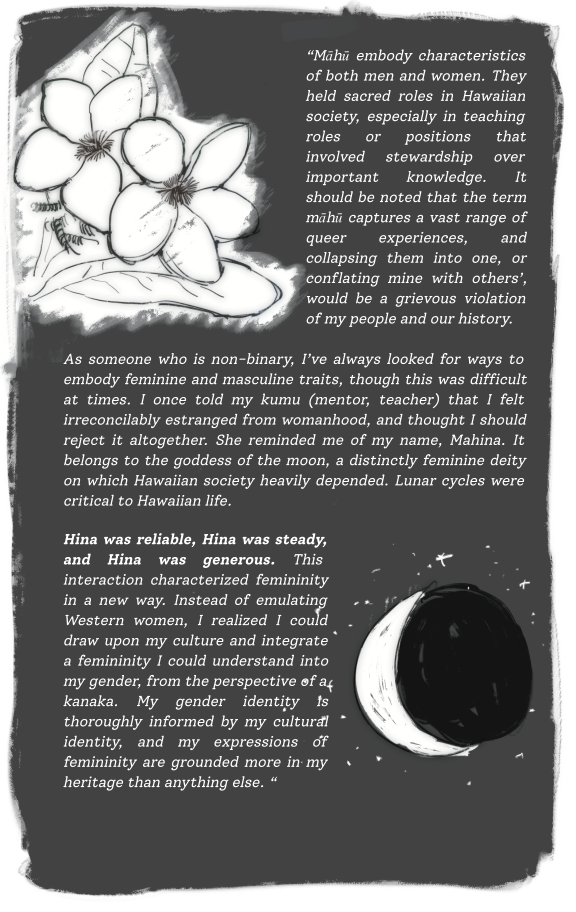
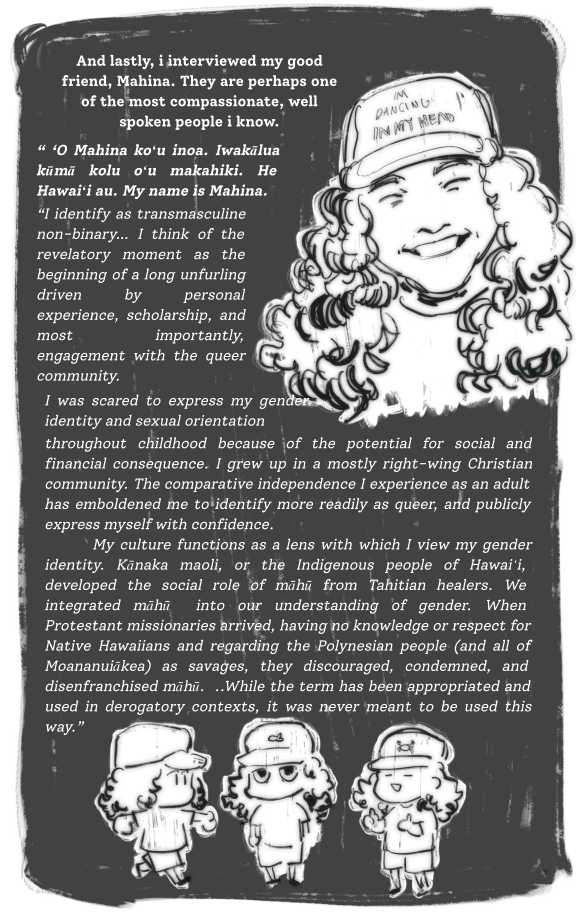
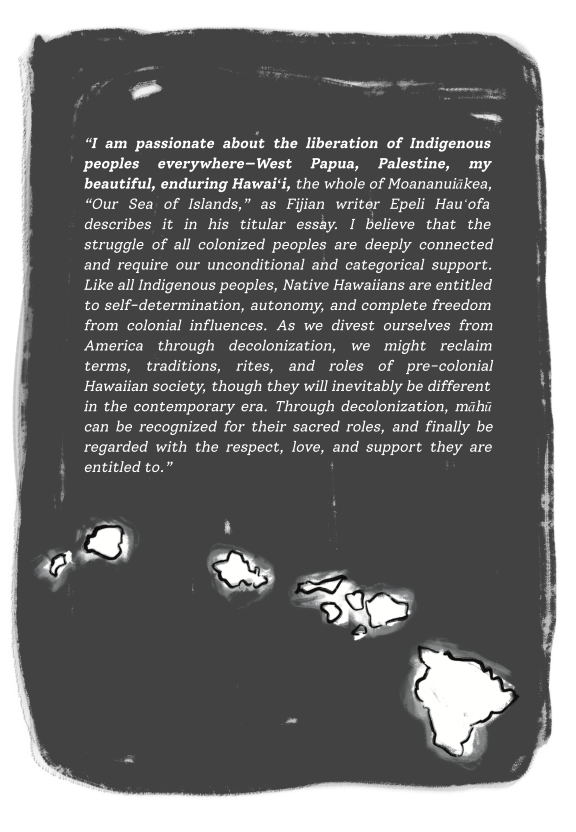
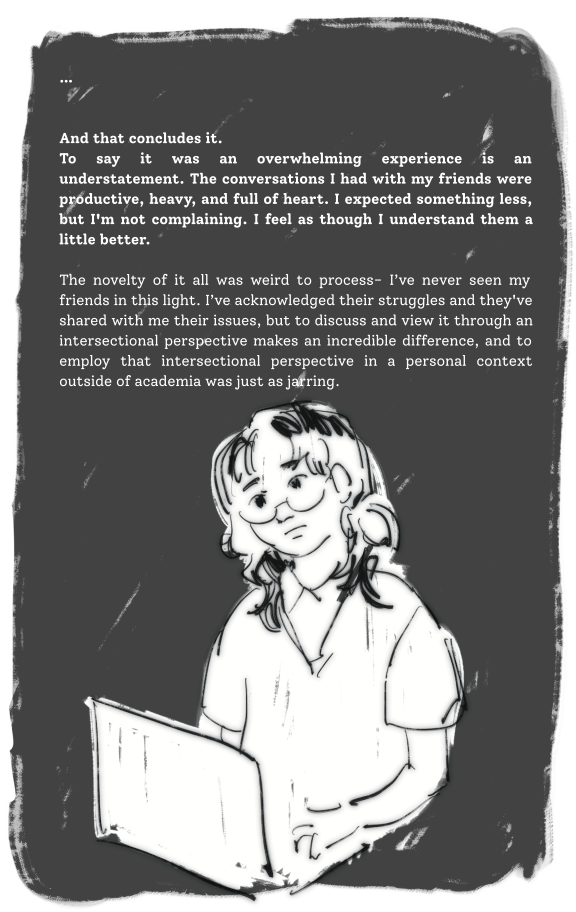
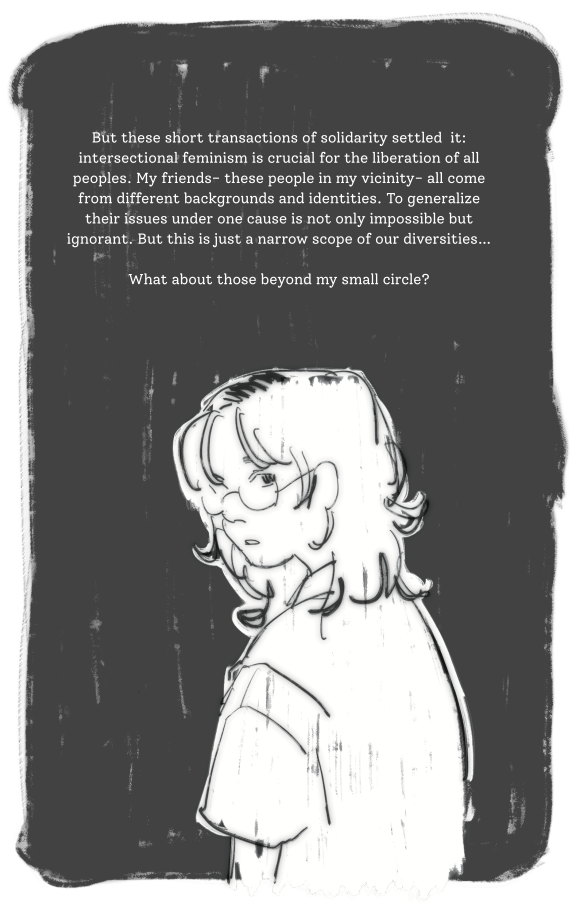
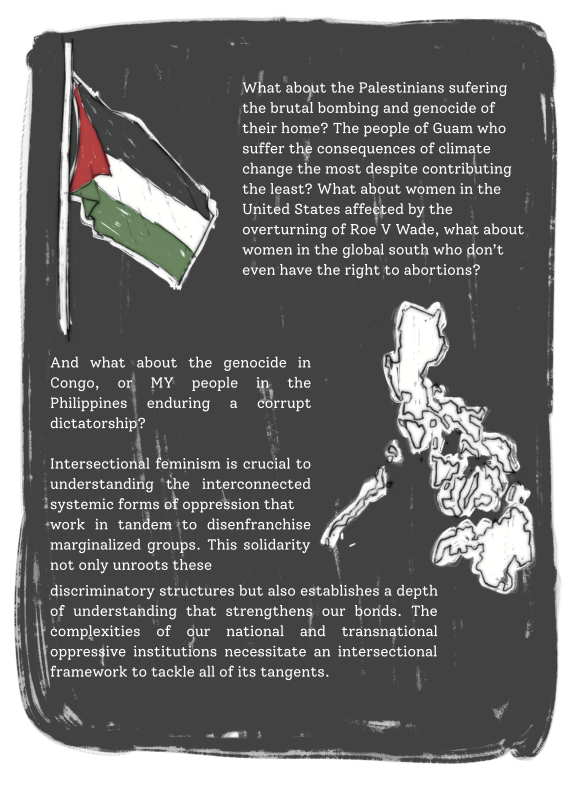
This personal artifact originally started as a short comic where I would broadly introduce my friends to highlight our differences in the context of intersectionality. What began as a small project became something more ambitious and self-indulgent.
Except for Vatthana, I interviewed all my friends online due to conflicting schedules. This gave them a lot of liberty to type whatever came to mind at their own pace, but I did not expect them to provide paragraphs. Mahina, ever the generous person they are, even went as far as to provide a Google doc where they organized their answers. This changed the trajectory of my project, and instead, I decided to create illustrated text pages. I could not paraphrase their experiences and condense them into comic panels. They were too intimate, vulnerable, and powerful. I directly quoted their responses and excerpts into my work. I let their words dictate my project. The final product is lengthy, but it only covers a small fraction of what my friends have shared.
This entire experience changed my outlook on intersectionality. To witness its abstractions and theories manifest themselves in the personal context- in the form of my friends- was something beyond my comprehension. It made the personal political, and I now understand what Audre Lorde meant when she said, “Difference is that raw and powerful connection from which our power is forged." in her work, The Master's Tools will Never Dismantle the Master's House. This is what intersectional feminism is about. The mere acknowledgment of our differences and our struggles creates a comprehension that sparks a radicalization necessary for change. This is the coalition and togetherness that I strive for in my feminist utopia. We cannot operate on tolerance. This political and emotional empathy is what generates momentum towards liberation.